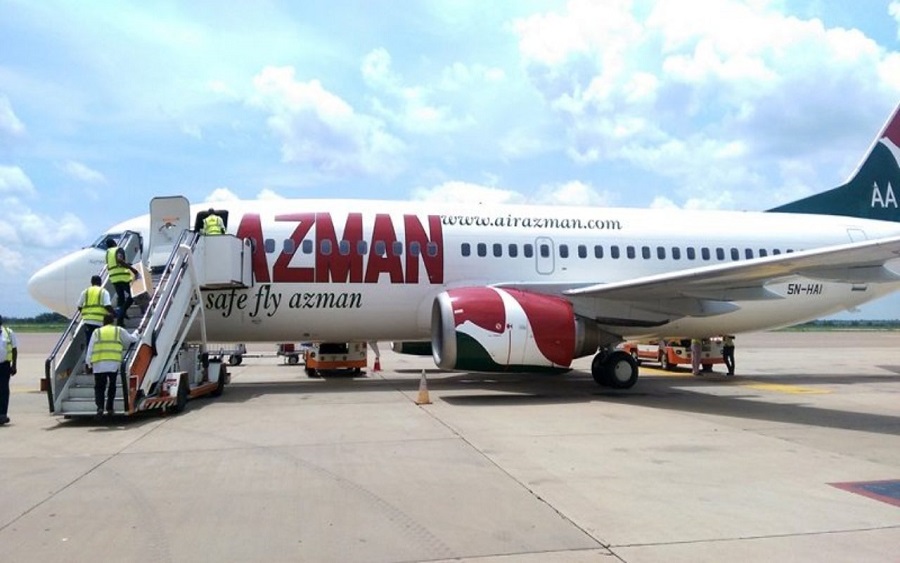Barely 24 hours after its Air Transport Licence (ATL) was suspended due to its failure to renew the documents and its inability to pay back the legacy debt of N1.2 billion to the Nigerian Civil Aviation Authority (NCAA), Azman Air has returned to service.
A source close to NCAA in Lagos confided in our correspondent that the troubled airline had also signed a Memorandum of Understanding (MoU) of N50 million monthly on the repayment of its N1.2 billion legacy debt accrued from the 5% Ticket Sales Charge and Cargo Sales Charge (TSC/CSC), which was collected from air travellers and cargo operators.
It was learnt that the formalities for the MoU signing would be finalised today at the NCAA headquarters in Abuja, but the regulatory agency had already lifted the sanction on the airline following its compliance with the various agreements reached.
The 5% TSC/CSC is shared among five aviation agencies; NCAA, Nigerian Airspace Management Agency (NAMA), Accident Investigation Bureau (AIB) Nigerian Meteorological Agency (NiMET) and the Nigerian College of Aviation Technology (NCAT), Zaria.
NCAA gets 58% from the total 5% of charges, which is the major revenue earning for the agency, while the other four agencies share the remaining 42 per cent in different proportions.
Besides, our correspondent gathered that the airline had also submitted its tax and security clearance forms to the NCAA, after its initial reluctance to do so for about 10 months without any basic reason.
Tax and security clearance forms are two of the requirements for issuance of ATL or Air Operators Licence (AOC) or their renewals by NCAA.
Since the operations of the airline were suspended on Thursday, its management had held a series of meetings with the NCAA.
Sales of air tickets
- A search on the portal of the airline by our correspondent indicated that the carrier had resumed sales of air tickets to most of its routes.
- For instance, ticket sales on its Lagos-Kaduna, Lagos-Kano, Kano-Abuja, Abuja-Lagos and others were restored on the airline’s portal; it also encouraged air travellers to fly with it.
- The airline also posted on its various media handles confirming the restoration of flight schedules.
What expert is saying
Aviation consultant, Engr. Williams Nwachukwu, expressed dismay at the attitude of some of the nation’s carriers to compliance of rules.
Nwahcukwu explained that the majority of the airlines were hugely indebted to NCAA, NAMA and several other service providers without the plan of paying back their debts.
According to him, the 5% TSC was added to the cost of air tickets of passengers by the airlines and was supposed to be remitted to the NCAA for onward distribution to other agencies, but lamented that most of the airlines refused to remit the funds.
He said: “Though, we are in a sector that gives room to credit, but, we must prove to be creditworthy. Airlines are supposed to be a warehouse for the collection and remittance of some of these funds collected from passengers, but they blatantly refuse to remit accordingly.
“We all know we are in the business of flying and if you don’t operate for one day, you will lose a lot of money. Why then do we prefer not to act like a real businessman? Definitely, you knew you would comply, then, why did you allow your operations to be disrupted and suffer a huge loss?”
NCAA tough stance
- The Director-General of Nigerian Civil Aviation Authority (NCAA), Capt. Musa Nuhu had insisted on Thursday that the ATL of the airline would not be renewed unless it mapped out a favourable plan for the repayment of the N1.2 billion debt for over eight years.
- For instance, he explained that the management of the airline had promised to pay back the sum of N10 million monthly as part of the N1.2 billion debt, but said the regulatory body insisted on N50 million monthly from the airline.
- He said: “Besides, the airline owed us N1.2 billion as TSC/CSC. We invited them, set up a committee for that purpose. Azman said they would only pay the sum of N10 million monthly out of the debt, which we refused. They later came up to N20 million, but we insisted on N50 million monthly. If we had agreed to the N10 million monthly request, it would have taken them about 12 years to repay back the money it had already collected and by then, the money would have lost its value.”
